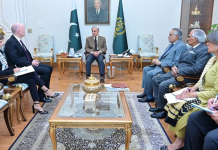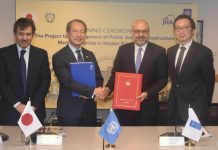WASHINGTON, APR 2 – Even without face-to-face talks, which Tehran has ruled out, the presence of both of Iran and the United States in the Austrian capital would mark a step forward in efforts to bring both sides back into compliance with the accord.
“Iran and the U.S. will be in the same town, but not the same room,” a European diplomatic source said. A Western diplomat said a shuttle diplomacy approach would be adopted.
Iran, China, Russia, France, Germany and Britain – all parties to the 2015 deal – discussed on Friday the possible return to it of the United States, and how to ensure full and effective implementation by all sides.
U.S. President Joe Biden‘s predecessor, Donald Trump, withdrew from the deal in 2018 and reimposed U.S. sanctions on Iran, prompting Tehran to violate some of the pact’s nuclear restrictions in retaliation.
The EU, which is coordinating efforts to revive the deal, said next week’s participants in Vienna would seek to “clearly identify sanctions-lifting and nuclear implementation measures,” including through convening meetings of relevant expert groups.
“In this context, the coordinator will also intensify separate contacts in Vienna with all JCPOA participants and the United States,” it added in a statement, referring to the acronym for the deal.
RELATED COVERAGE
Iran rejects meeting with U.S. at Vienna nuclear deal talks
After Friday’s meeting, Iran’s Deputy Foreign Minister Abbas Araqchi, a senior negotiator in the talks, said the United States would not be present at any session attended by Iran in Vienna and affirmed Iran’s stance on what needed to be done.
“Iran will suspend its steps (scaling back compliance with the deal’s terms) as soon as (U.S.) sanctions are lifted and this is verified,” Araqchi said, according to Fars.
The Biden administration has been seeking to engage Iran in talks about both sides resuming compliance. Under the accord, U.S. and other economic sanctions on Tehran were removed in return for curbs on Iran’s nuclear programme to make it harder to develop a nuclear weapon – an ambition Tehran denies.
German Foreign Minister Heiko Maas said it was good that talks were resuming, but time was of the essence.
“An agreement that is once again fully respected would be a plus for security for the entire region and the best basis for talks on other important issues of regional stability,” he said in a statement.
Russia’s ambassador to the U.N. atomic watchdog said Friday’s talks had given him the impression they were on the right track but the way ahead would not be easy.











